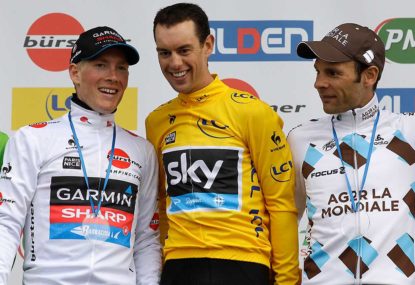'I've just won a stage of the Tour de France, mate!': Hindley grabs yellow jersey as Aussie blows Tour apart
Australia's Jai Hindley has said he is "lost for words" after a shock stage victory at the Tour de France earned him the leader's…

In part two of my blog, I will look into Team Sky’s dominance of the Tour in recent times, and question some of the key contender’s motives.
Team Sky’s tactics
Maybe people’s feelings of overall boredom are not about the actual race situation, but the way in which Team Sky have been able to assert such suffocation over their rivals since Bradley Wiggins rode into yellow back in 2012. These feelings have been slowly growing since that time, and every year seem to get just that little bit more noticeable.
People have been asking the question of how to solve the issue of Sky’s dominance. It’s a hard one to solve. Team Sky have shown definite signs of weakness on two notable occasions over the last two years, being the backend of the 2015 Tour de France, and on the final stage of the 2014 Criterium du Dauphine.
On both occasions, when a team sent riders up the road and attacked the race early, did the race start to work in their favour. We did not see any of this during this Tour.
In fact, we saw the complete opposite, with Chris Froome attacking on the descent of the Col de Peyresourde, something we had not seen so far in Froome’s career.
Even though the descent was quite open, and not very technical, he looked fantastic on the wide open roads, and was able to win Stage 8 by 13 seconds.
The same cannot be said for the other favourites, most notably Nairo Quintana who let the gap open up at the top of the descent. A mistake yes, but one that should not have been a problem on such a wide open, pedalling descent.
Quintana’s teammate Valverde attempted to bridge, however did not get any support until BMC came to the front in the final few kilometres, when the gap was already too far to bridge.
Both BMC, Movistar, and in my opinion, both Daniel Martin and Joaquin Rodriguez should have all helped to pull that break from Froome back. Martin, Rodriguez and Valverde would have been the favourites to win from the reduced sprint finish had there been one.
Stage 8 was the start of a Tour full of potential winners of the race waiting for others to do the work for them.
Another instance of questionable tactics was on Stage 19, when Astana attacked early in the stage with a team attack, however, failed to ram home the advantage and make the attack more than just a show of numbers at the front.
We as fans always love the surprise attacks and whether they succeed or not, we will respect the challengers for making such attacks. Contador’s attack to win the Vuelta in 2012 and Schleck taking a 60 kilometre escape to win a top of the Galibier in 2011 are just some of the incredible moments over the last ten years that have captivated cycling fans because such attacks were thought to be a tad crazy.
If Sky is not going to get attacked, then it is not their fault that the race is boring or uninteresting. That’s the way they win, why would they stop doing that?
The main cause for concern is the fact that the key contenders (Quintana, I am referring to you) did not put in one major attack against Sky this year. Therein lies the problem; too many people racing for second place.
Maybe that is the smart thing to do, as they may know that they do not have the legs to compete with Froome, however, you won’t know what your abilities are if you do not try.
Some had their reasons, like Adam Yates and Louis Meintjes, who were revelations this Tour, however, for the other contenders, they only have themselves to blame for not winning, if that was even their objective in the first place.
Part 3 of my blog will discuss the next crop of riders coming through, and sum up the main reasons why I found this Tour to be intriguing.